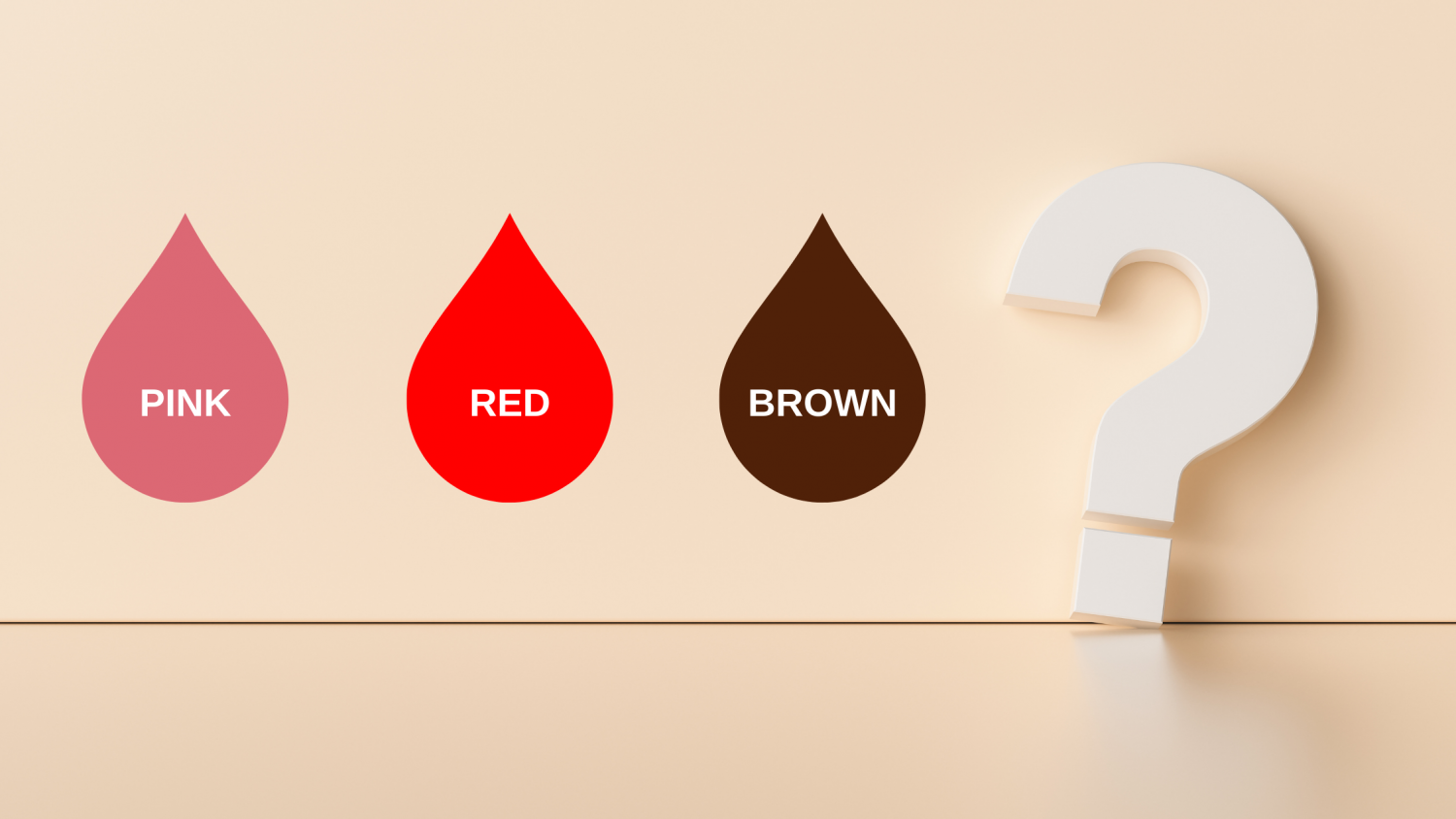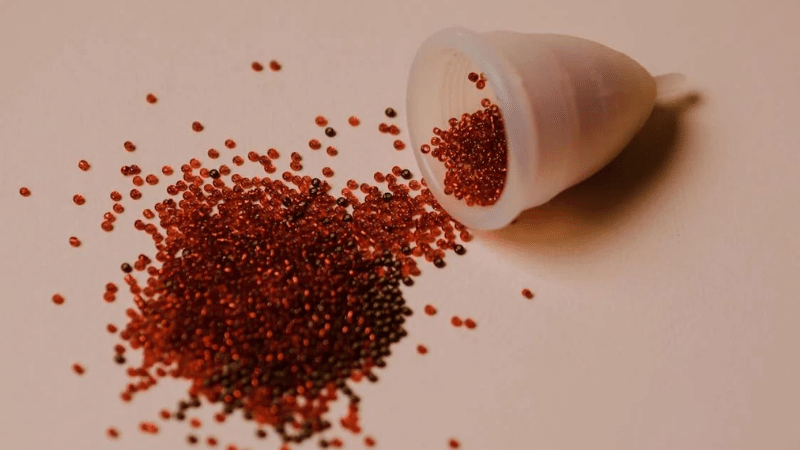
What Does Brown Period Blood Mean?
The color of a woman’s period blood can indicate health conditions affecting her body. Although sometimes considered abnormal, many women experience brown or dark brown period blood towards the beginning or end of their periods. Others notice brown-tinged spotting mid-cycle. For most, this is considered normal and is not something to worry about. For some, brown period blood or brown discharge during their periods may indicate an underlying health condition requiring medical attention, such as fibroids.
Understanding why your period is brown can provide valuable insights into your reproductive health, ensuring timely intervention and fostering a greater sense of well-being.
Can Fibroids Cause Brown Period Blood?

While brown period blood is common – studies suggest that up to 60 percent of women experience brown discharge at some point during their menstrual cycle- if it is accompanied by atypical symptoms may indicate the presence of uterine fibroids. This non-cancerous tumor can develop in or on the uterus.
Although some individuals may not show typical symptoms associated with fibroids, such as heavy bleeding or pelvic pain, it’s important to investigate any irregularities in menstrual bleeding to ensure a proper diagnosis. Not only can fibroids lead to changes in the color and consistency of menstrual blood, but their size and location significantly influence the severity and range of symptoms experienced. Larger fibroids, or those located within the uterine lining, for example, can cause more pronounced bleeding and discomfort, affecting everyday activities and overall quality of life.
Fibroids can result in a range of painful, uncomfortable, and inconvenient symptoms, and when left untreated, they can eventually harm surrounding organs and even impact fertility. Common symptoms of fibroids include:
- Heavy or prolonged menstruation lasting longer than 7 days
- Anemia, which can lead to fatigue
- Pain during intercourse
- Frequent urination
- Constipation and/or bloating
- Pain in your pelvis or lower back
- Increased menstrual cramping
- Stomach swelling
Someone with fibroids also may have clots during their periods. If you experience brown period blood along with the above symptoms, we recommend talking to your doctor to determine if you may have fibroids.
WORRIED YOU MAY HAVE FIBROIDS? TAKE OUR SYMPTOM QUIZ
Why Do Fibroids Cause Brown Discharge During My Period?
One of the most common symptoms for women with fibroids is heavy or abnormal bleeding, known as menorrhagia. Menorrhagia occurs when a fibroid has grown large enough to block blood flow during menstruation. When the blood passes the fibroid, it will appear as brown bleeding during a period because it is older and has oxidized.
As fibroids grow, they can also irritate the uterine lining, leading to additional bleeding. The endometrium, the uterus lining, may increase in size as the fibroids get bigger, causing longer and heavier periods.
Many times, brown discharge from uterine fibroids during a period is accompanied by other symptoms, such as longer and heavier periods and cramps. However, other women may never notice or experience any fibroid symptoms.
Treatment may be beneficial if you are concerned about brown period blood or brown discharge at any point in your cycle. Our fibroid specialists can discuss treatment options that may help stop the bleeding, cramps, and other fibroid symptoms.
Other Causes of Brown Period Blood
If you notice brown discharge during a period alongside the cramping, it may indicate the possibility of several different conditions, such as:
- Pelvic inflammatory disease: An infection of the reproductive organs, most often seen between periods.
- Endometriosis: Endometrial cells develop outside where they are normally found in the uterus.
- Cervicitis: An inflammation of the cervix that may cause brown discharge between periods along with cramping
- Uterine fibroids: Benign growths that develop along the lining of the uterus
If you’re concerned fibroids may be causing your brown period blood or cramps, schedule a consultation at USA Fibroid Centers to get your questions answered by one of our leading fibroid specialists.
SCHEDULE A HEALTH CONSULTATION
Is Brown Period Blood a Sign of Pregnancy?
Aside from health conditions, another cause of the brown period blood may be pregnancy. An early pregnancy sign some women may notice is dark brown period spotting or brown discharge during their period.¹
However, when already pregnant, brown period blood can be a sign of a miscarriage or an ectopic pregnancy. An ectopic pregnancy is when the embryo attaches to the outside of the uterus, often leading to a spontaneous miscarriage.
If you’re pregnant and getting brown period blood or brown discharge, it’s best to seek medical attention immediately.
When to Contact a Doctor About Brown Period Blood

There is often no need to worry about brown period blood if it happens near the beginning or end of your period or if you have light periods. Blood turns brown when it has more time to oxidize or be exposed to oxygen.
However, brown period blood occurring with one or more of the following symptoms could indicate something more serious:
- Periods lasting longer than seven days
- Heavy bleeding
- Menstrual cycles shorter than 21 days or longer than 35 days
- Missed periods
- Breakthrough bleeding and spotting
- Bleeding after menopause
- Pain or bleeding during or after sex
- Pelvic pain or pressure
- Painful or frequent urination
- Unusual vaginal discharge
- Fever
If you experience brown period blood during your menstrual cycle along with any of these symptoms, it’s important you seek medical care immediately. These symptoms may indicate various health conditions, including uterine fibroids.
Treating Fibroids at USA Fibroid Centers
If you’re wondering whether your brown period blood, heavy bleeding, pelvic pain, and other symptoms may be due to uterine fibroids, we are here to help. USA Fibroid Centers is dedicated to helping women find relief from their symptoms before they get worse. We believe no woman should suffer painful fibroid symptoms without knowing her treatment options. Although many women believe that a hysterectomy, the complete surgical removal of the uterus, is the only available fibroid treatment, there are non-surgical options available.
At USA Fibroid Centers, we offer an outpatient, non-surgical fibroid treatment called Uterine Fibroid Embolization (UFE). UFE can eliminate your symptoms, preserve your uterus, and quickly get you back to normal activities. The procedure takes only 30 to 45 minutes and does not involve a hospital stay; you can go home the same day. There’s also a short recovery time, with most women returning to their regular schedules within one to two weeks.
Schedule a consultation with one of our leading experts to learn more about UFE and how it may help relieve your symptoms.
Sources
- Lana Burgess, “Brown Discharge before Period: Causes and What It Could Mean,” ed. Tahirah Redhead, Medical News Today, December 6, 2023,.



